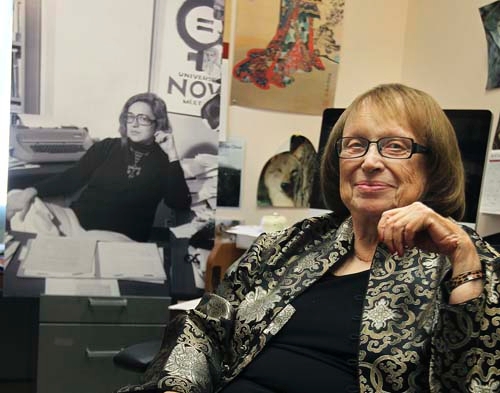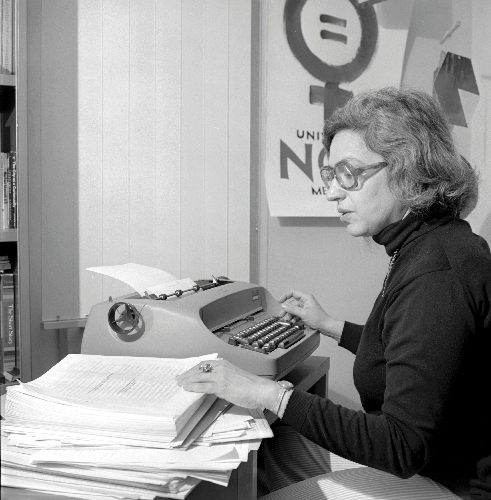UNLV professor passes along lessons from lifetime of teaching



Felicia Campbell grew up in a tiny Midwestern town and went to college nearby, just like she was supposed to.
She earned a degree in English, because that’s what girls who went to college did in the 1950s.
But then?
She joined the Marines, considered moving to Nigeria, took a job in the middle of nowhere, got married, had babies, sued her employer, became an expert in a field she practically created, took off one summer for the other side of the world, discovered something about herself there, kept going, learned some more, and passed it along to her students.
She’s been doing that for 50 years now as an English professor at the University of Nevada, Las Vegas, the longest-serving professor at the university. She was recently honored by the school for the accomplishment.
“She’s a remarkable woman,” said English professor Joe McCullough, who is retiring this year after 44 years at the university.
He recalled coming to UNLV in 1969 as one of several new professors at the fast-growing school. He said he always saw Campbell as someone who made a difference, always involved, always on the cutting edge.
She was one of the first scholars in the country to take science fiction seriously, establishing a course on the topic. She quickly became an expert in the psychology of gambling, and has taught courses in Asian literature and women’s literature, in addition to more traditional classes.
“I’ve come to value her very much over the years,” McCullough said.
AGAINST THE GRAIN
Campbell, 81, didn’t always want to be a professor.
She grew up during the 1930s and ’40s in a small Wisconsin town, the youngest daughter of a drug store owner.
She loved to read and, in her family, it was simply assumed she’d go to college. She chose the nearby University of Wisconsin, where she majored in English.
But when she was through, she shunned the normal and joined the Marines. This was the early 1950s, and she was among the first class of women who were training to be officers.
But the culture rankled her, the way she saw women being treated. She did not like it, and she tried to do something about it. But, it did not work, and she left after seven months.
She enrolled in graduate school, again in Wisconsin. When she had earned her master’s degree, she kept going. She finished all the coursework for her doctorate, but got restless.
She applied for a job at the University of Ibadan in Nigeria and at a little outpost in Las Vegas. Formally called the Southern Regional Division of the University of Nevada, it was popularly known as Nevada Southern.
Classes started there in 1957, and by 1962, when Campbell arrived, there were about 2,000 students taking courses and just five buildings on the tiny campus.
By 1969, the university changed its name to the University of Nevada, Las Vegas. Within a few years, it would overtake the University of Nevada, Reno, in student population and never look back.
ALWAYS A STUDENT
Campbell did not get the job in Nigeria, but she did accept one in Las Vegas after a telephone interview. She had never been here.
She was stunned at what she saw when she arrived. She laughed thinking back on it, recalling a comment from a friend that they had signed up to work at a gas station.
“There was nothing between here and Sahara Avenue,” she said, sitting in her sixth-floor office.
But she quickly became enamored with the town surrounding the fledgling university. She married a craps dealer and started wondering about those folks who gamble.
What drew them in? Surely, there must be something.
As UNLV began to grow, an effort was made to formalize its credentials. Campbell, who had never done her dissertation and so did not earn her doctorate, went back to school, all the while remaining a professor.
She earned an interdisciplinary doctorate, titling her dissertation “The Gambling Mystique, Mythologies and Typologies.”
She kept teaching, eventually earning tenure. She was a student of popular culture, never dismissing it as irrelevant like so many academics can.
Conflict and accomplishment
Though she was from the Midwest, with greenery, seasons and snow, she actually liked living in the desert. She had a couple of children and settled down.
“I loved the way it looked,” she said of the desert. “I loved the solitude.”
But not all was perfect.
She wasn’t happy with the racist nature of her new hometown, and she was really unhappy with the way women were treated at the university.
“I didn’t know I was coming to the Mississippi of the West,” she said.
Women were paid less than men. They were promoted less often, not hired as much.
She and a group of others sued.
“I thought I could change the world,” she said.
Everyone else settled.
Campbell kept going. The conflict dragged on for years, though, and it took its toll. Eventually, she settled, too.
By then, the early 1980s, her marriage had ended. Her kids were all but grown. She was alone, and she still had that adventurous streak inside her.
So, she took some of the money she received in the settlement and did something crazy.
Discovering herself
She went with a couple of friends to K2 in Pakistan, the second-highest mountain in the world.
She was 52 years old. She was not an outdoorsy type.
And yet, she trekked 300 miles across rough terrain to get to the base camp. She made it to 16,000 feet, not the peak, but quite an accomplishment.
“It changed my life,” she said. “To do something like that brought such an incredible amount of self-confidence.”
She realized that she could do just about anything she wanted to do.
“That was the single most important thing I’ve ever done,” she said.
After that summer, she jumped back into teaching. Gambling and literature, women and adventure, science fiction, noir, chaos theory, pop culture as literature.
She delivered papers, wrote articles, wrote stories. She reviewed more than 400 books on local radio at KNPR.
She was the president of the Popular Culture Association and was editor of the annual “Pop Culture Review.” In 1989, she founded the Far West Popular Culture Association and the Far West American Culture Association.
Despite her age, Campbell said she is not retiring. Not soon, anyway.
She doesn’t care if that’s what you’re supposed to do after 50 years.
She rarely does what she’s supposed to anymore.
Contact reporter Richard Lake at rlake@reviewjournal.com or 702-383-0307.












